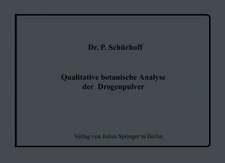Recombinant Enzymes - From Basic Science to Commercialization
Editat de Azura Amiden Limba Engleză Hardback – 20 ian 2015
Readers will discover the importance of the cloning method as it influences the upstream and downstream processes and determines the level of success of the recombinant enzyme commercialization processes. We see that the two main factors that are particularly sensitive during the cloning process are the vector and the host.
A discussion of analytical techniques is presented followed by studies on important stages during the upstream processes including the process of optimizing the media to get results and high enzyme activity. Downstream processes such as the cell disruption technique, purification and formulation of the final product are then considered. The reader is introduced to software that helps streamline recombinant enzyme production from the upstream to downstream processes, to facilitate the process of up-scaling production.
This work includes a case study as tool, to guide understanding of the commercialization process. The work is written for researchers in the field and is especially suited to those who are under pressure to embark on the tough process of commercialization.
Preț: 642.03 lei
Preț vechi: 755.33 lei
-15% Nou
Puncte Express: 963
Preț estimativ în valută:
122.86€ • 131.37$ • 102.43£
122.86€ • 131.37$ • 102.43£
Carte tipărită la comandă
Livrare economică 18 aprilie-02 mai
Preluare comenzi: 021 569.72.76
Specificații
ISBN-13: 9783319123967
ISBN-10: 3319123963
Pagini: 188
Ilustrații: X, 188 p. 61 illus.
Dimensiuni: 155 x 235 x 15 mm
Greutate: 0.46 kg
Ediția:2015
Editura: Springer International Publishing
Colecția Springer
Locul publicării:Cham, Switzerland
ISBN-10: 3319123963
Pagini: 188
Ilustrații: X, 188 p. 61 illus.
Dimensiuni: 155 x 235 x 15 mm
Greutate: 0.46 kg
Ediția:2015
Editura: Springer International Publishing
Colecția Springer
Locul publicării:Cham, Switzerland
Public țintă
ResearchCuprins
Introduction to Recombinant Enzyme Pre-commercialization.- Recombinant Enzyme: Cloning and Expression.- Common Laboratory Procedure.- Characterization of Recombinant Enzymes.- Purification of Recombinant Protein for Industrial Use.- Recombinant Enzyme Fermentation.- Scaling-up Recombinant Enzyme Fermentation.- Downstream Processing of Recombinant Enzymes for Commercialization.- Economic and Environmental Evaluation of Recombinant Enzyme Production.- Case Study: Recombinant Bromelain Selection.- Case Study: Recombinant Bromelain Cloning, Characterization and Upstream Processes.- Case Study: Recombinant Bromelain Downstream Processing.
Textul de pe ultima copertă
This edited work presents studies that clarify the basics of producing recombinant enzymes that finally lead to commercialization. It enables researchers to see what is crucial to the commercialization process, from examining the cloning method, using analytical techniques such as calculating the total protein content and enzyme activity, through considering upstream and downstream processes, to the final product.
Readers will discover the importance of the cloning method as it influences the upstream and downstream processes and determines the level of success of the recombinant enzyme commercialization processes. We see that the two main factors that are particularly sensitive during the cloning process are the vector and the host.
A discussion of analytical techniques is presented followed by studies on important stages during the upstream processes including the process of optimizing the media to get results and high enzyme activity. Downstream processes such as the cell disruption technique, purification and formulation of the final product are then considered. The reader is introduced to software that helps streamline recombinant enzyme production from the upstream to downstream processes, to facilitate the process of up-scaling production.
This work includes a case study as tool, to guide understanding of the commercialization process. The work is written for researchers in the field and is especially suited to those who are under pressure to embark on the tough process of commercialization.
Readers will discover the importance of the cloning method as it influences the upstream and downstream processes and determines the level of success of the recombinant enzyme commercialization processes. We see that the two main factors that are particularly sensitive during the cloning process are the vector and the host.
A discussion of analytical techniques is presented followed by studies on important stages during the upstream processes including the process of optimizing the media to get results and high enzyme activity. Downstream processes such as the cell disruption technique, purification and formulation of the final product are then considered. The reader is introduced to software that helps streamline recombinant enzyme production from the upstream to downstream processes, to facilitate the process of up-scaling production.
This work includes a case study as tool, to guide understanding of the commercialization process. The work is written for researchers in the field and is especially suited to those who are under pressure to embark on the tough process of commercialization.
Caracteristici
Builds a bridge in the understanding between researchers and manufacturers in the field of recombinant enzymes Provides a thorough overview to assist the reader's understanding of the inter-related topics Some chapters are written in laboratory procedures style Incorporating tools in scaling up for commercialization Includes supplementary material: sn.pub/extras




















